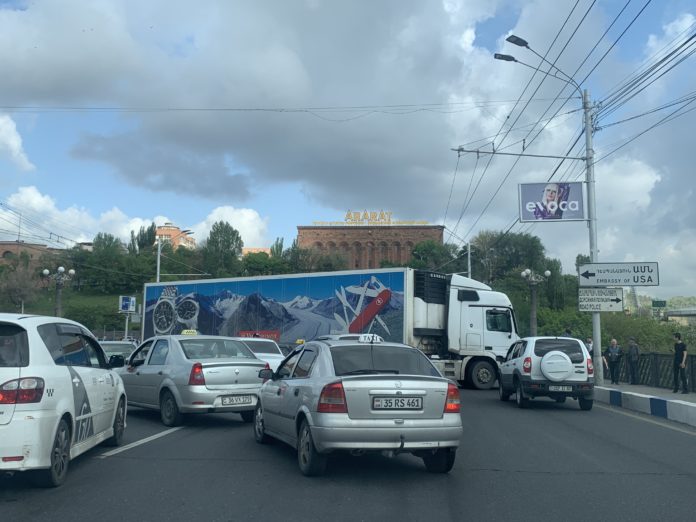YEREVAN –– Activists affiliated with the “I Have Honor” and “Armenia Alliance” parliamentary opposition blocs have been engaged in a series of civil disobedience actions and protests since May 1, as part of an effort to force Prime Minister Nikol Pashinyan’s resignation. Protesters, led by key figures from the administrations of Presidents Serzh Sargsyan and Robert Kocharyan, accuse the prime minister of a conspiracy to “sell” Artsakh to Azerbaijan, and to “Turkify” Armenia itself. They also blame him entirely for Armenia’s defeat in the 2020 Second Artsakh War.
This latest round of protest comes as a response to a speech which Pashinyan made on April 14 when, upon his return from a controversial round of negotiations with his Azerbaijani counterpart hosted by EU President Charles Michel in Brussels. He announced to Parliament that the “international community expects us to lower the bar just a little on the issue of Artsakh’s independence” in order to throw its backing behind Armenia in negotiations. Opposition figures took these cryptic words, along with Foreign Minister Ararat Mirzoyan’s agreement to five negotiation points with Azerbaijan, as a tacit admission that the government was preparing to abandon Artsakh to Azerbaijani control, promptly calling for the government’s removal yet again.
Pashinyan later clarified his comments during a cabinet meeting held on April 22, following his meeting with Russian President Vladimir Putin, in which he pointed out that “lowering the bar” on status had been part of the negotiation format for every peace summit that Armenia participated in since the 1990s. “Various documents adopted by various international bodies since the 1990s contained direct or indirect calls for lowering the bar. And that the meaning of these facts were carefully hidden from our public doesn’t mean that they didn’t exist,” Pashinyan said. He also suggested that “lowering the bar” in this context meant maintaining the status quo while delaying negotiations on a final status for Artsakh for the time being. He added that Armenia had received security guarantees from President Putin over Artsakh. Pashinyan declared Armenia’s priority as ensuring “the kind of situation or solution where Artsakhtsis continue to live in Artsakh […], for them to live in a way that they feel themselves Karabakhtsi, Artsakhtsi and Armenian.”
Political analyst Tigran Grigoryan, himself an Artsakh native, noted that the government’s shift in position from a guarantee of status for Artsakh towards a guarantee of human rights for the people of Artsakh was a result of external pressure, primarily from EU negotiators. “The process started in June 2021. Between the parliamentary election, and the adoption of the government’s agenda, a number of European delegations visited the region, and publicly messaged that Armenia needs to focus on economic growth and democratization, white the less-published second part of that message was that Armenia should probably abandon some of its positions on Karabakh,” he told Civilnet host Emilio Cricchio. Indeed, Nikol Pashinyan campaigned on the promise of pursuing a policy of remedial secession for Artsakh in the runup to the 2021 election, and this position remains on his party’s website. However, a number of regional and global events have shifted the government’s political calculus.
Russia’s invasion of Ukraine in February complicated negotiations for both Yerevan and Baku, and significantly raised the threat of renewed violence in the region. Azerbaijan used the opportunity to put more pressure on both Armenia and Russia by cutting off gas to Artsakh, and attempting to capture a village which was officially under the Russian peacekeepers’ mandate. Lightly armed Russian troops have few mechanisms with which to de-escalate tension in the region, while the Russian military presence as a whole has been reduced with the redeployment of some forces from their 102nd Military Base in Gyumri to Ukraine. Meanwhile Armenia continues to undergo a far-reaching military reform and reequipment process, while trying to avoid any escalation with its authoritarian neighbor.
While concurrent negotiations with Turkey continue despite providing little in terms of concrete results, a report by Crisis Group calls the resumption of talks by all parties, including the Organization of Security and Cooperation in Europe (OSCE) Minsk Group, United States, France, Russia, Armenia, Azerbaijan and even Turkey, essential to preventing a return to violence in the region. “The way forward in the meantime may therefore be to continue pursuing common ground where it is most likely to be found — on issues of common economic interest – and begin to address status and other political issues as openings present themselves,” the group concludes, adding that this approach might help create space for the parties to ease tensions and enable economic engagement to proceed.









